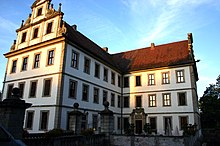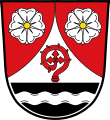
Freiherr, Freifrau and Freiin are designations used as titles of nobility in the German-speaking areas of the Holy Roman Empire and in its various successor states, including Austria, Prussia, Bavaria, Liechtenstein, Luxembourg, etc. Traditionally, it denotes the titled rank within the nobility above Ritter (knight) and Edler and below Graf. The title superseded the earlier medieval form, Edelherr.

The House of Nesselrode is a noble family originating in the Duchy of Berg. Over the centuries, the family expanded their possessions through marriage with the most powerful families of the region. As a former ruling family they belonged to the small circle of Uradel.

The Prince-Bishopric of Würzburg was an ecclesiastical principality of the Holy Roman Empire located in Lower Franconia, west of the Prince-Bishopric of Bamberg. Würzburg had been a diocese since 743. As established by the Concordat of 1448, bishops in Germany were chosen by the canons of the cathedral chapter and their election was later confirmed by the pope. Following a common practice in Germany, the prince-bishops of Würzburg were frequently elected to other ecclesiastical principalities as well. The last few prince-bishops resided at the Würzburg Residence, which is one of the grandest Baroque palaces in Europe.

The House of Schwarzenberg is a German (Franconian) and Czech (Bohemian) aristocratic family, formerly one of the most prominent European noble houses. The Schwarzenbergs are members of the German and Czech nobility, and they once held the rank of Princes of the Holy Roman Empire. The family belongs to the high nobility and traces its roots to the Lords of Seinsheim during the Middle Ages.

The House of Bibra was one of the leading Uradel families in Franconia and present day Thuringia from the mid-15th century to about 1600. Later on the family rose from Reichsritter to Reichsfreiherr. After the Holy Roman Empire dissolved, they were made ‘’Freiherr’‘ (Barons) of Bavaria and Bohemia.
Jakob Graf und Edler Herr von und zu Eltz-Kempenich genannt Faust von Stromberg, also referred to as Johann Jakob Eltz was a Knight of Malta, and a Croatian politician who became a key figure in Croatian politics during the 1990s. In Croatia, he is often styled as the count of Vukovar. He was President of the Association of Winemakers in Rheingau from 1964 to 1976. Jakob von und zu Eltz is the maternal grandfather of Karl-Theodor zu Guttenberg, a former German Minister of Defence.

Guttenberg is a municipality in the district of Kulmbach in Bavaria in Germany.

Karl Ludwig Freiherr von und zu Guttenberg was a member of the German anti-Nazi resistance. He was executed in the aftermath of the failure of the 20 July plot to assassinate Adolf Hitler.

Karl-Theodor Maria Nikolaus Johann Jacob Philipp Franz Joseph Sylvester Buhl-Freiherr von und zu Guttenberg, known professionally as Karl-Theodor zu Guttenberg, is a German businessman and politician of the Christian Social Union (CSU). He served as a member of the Bundestag from 2002 to 2011, as Secretary-General of the CSU from 2008 to 2009, as Federal Minister for Economics and Technology in 2009 and as Federal Minister of Defence from 2009 to 2011.

Karl Theodor Maria Georg Achaz Eberhardt Josef Freiherr von und zu Guttenberg was a German politician of the Christian Social Union of Bavaria (CSU). He was parliamentary secretary of state in the Chancellor's Office in the government of Kurt Georg Kiesinger from 1967 until 1969, as well as the foreign policy spokesman of the CDU/CSU group in the Bundestag. Guttenberg was perceived as a hardline conservative anticommunist as well as a convinced proponent of European integration. His work was mostly within the field of foreign policy.

Georg Enoch Robert Prosper Philipp Franz Karl Theodor Maria Heinrich Johannes Luitpold Hartmann Gundeloh Freiherr von und zu Guttenberg was a German conductor. He also owned the large winery estate Weingut Reichsrat von Buhl. He founded musical ensembles for performances of sacred choral works, and the Herrenchiemsee Festival. In 1975, he co-founded the BUND, a German organization dedicated to protecting the natural environment.
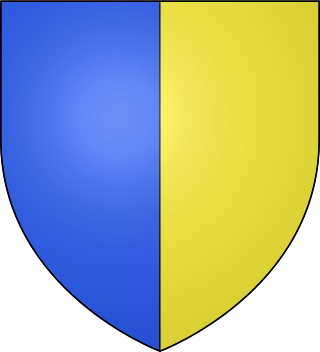
The House of Plettenberg is the name of the Westphalian noble family of the Uradel. It dates back at least to 1187, when Heidolphus de Plettenbrath was mentioned in a document by Philip I. Plettenberg-Wittem branch that ruled immediate Lodships of Meitingen and Sulmingen lost its sovereignty and became mediatised to Württemberg in 1806. This line of the family went extinct in 1813.

Raitz von Frentz is the name of a baronial (freiherrlichen) family, that belongs to the German ancient nobility (Uradel). The Barons Raitz von Frentz should be distinguished from the dynastic family "von Frenz", a branch of the Dukes of Limburg, that became extinct in the 14th century.
Roland Cantzler was a German jurist and politician, representative of the Christian Social Union of Bavaria. He was a member of the German Bundestag.
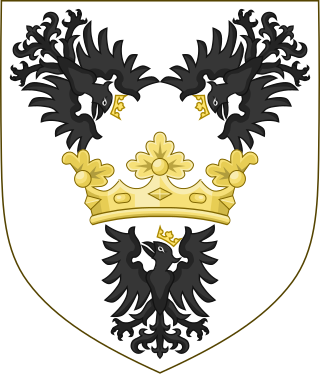
The House of Eggenberg was the name of an influential Austrian noble family from Styria, who achieved princely rank in the 17th century. The family's last male heir died in 1717, bringing an end to the House of Eggenberg.

The House of Franckenstein is the name of a feudal, Franconian noble family in Germany, descendants from the Dynasts of the Breuberg family; offsprings of the Lords of Lützelbach from Höchst im Odenwald.
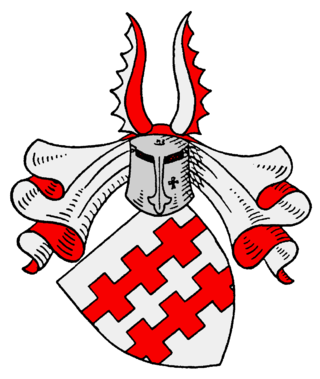
The Pranckh family is an ancient Austrian noble family, descending from Pranckh Castle, near Sankt Marein bei Knittelfeld in the former March and later Duchy of Styria. The family's origins date back to the year 1135, when Wolfkerus de Branka attested a charter regarding an endowment to Admont Abbey, thus making it one of the oldest families in Austria still present today. In addition to the Styrian mainline, other branches existed in Salzburg, Carinthia, Lower Austria and Bavaria. In later parts of history, the family rose from Knights to Reichsfreiherren (Barons of the Holy Roman Empire) and Reichsgrafen (Imperial Counts of the Holy Roman Empire). Many of their names can be found in high court and state offices of the Archbishopric of Salzburg. Branches of the family exist to this day in Austria, Germany, France and the United States.

The House of Egloffstein is an ancient Franconian aristocratic family (Uradel) with an eponymous family home in the hill region of Franconian Switzerland in the Bavarian province of Upper Franconia. The family first appears in the records in 1187 with a Heinrich genannt Stuchs who is also the progenitor. The house belongs to the brotherhood of Franconian Imperial Knights. Egloffstein Castle and Kunreuth Castle are to this day owned by the family.

The House of Poschinger is an ancient Bavarian noble family. Its origin date back to the year 1140. The family received the rank of Knights of the Holy Roman Empire. The Frauenau branch rose to the rank of Barons (Freiherr) in the Kingdom of Bavaria and held a hereditary seat in the House of Councillors.



